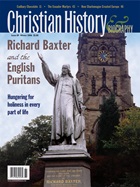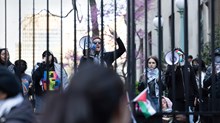Few moments in world history proved to be of greater significance than what transpired in St. Peter's Basilica in Rome on Christmas Day in the year 800.
All eyes in the basilica that day were fixed on an unusually tall, very energetic, and powerfully built man of 58, a Frankish king named Charles, as he knelt devoutly before the tomb of the Apostle Peter. Just as he was beginning to rise after his prayer, Charles was approached by the Bishop of Rome, Pope Leo III, who set a crown on his head and dramatically announced, "Charles Augustus, crowned great and peace-giving emperor of the Romans, life and victory!"
"Great" he was indeed, and that Latin adjective, magnus, was eventually assumed into the name by which he has been best known, Charlemagne. For the first time in more than three centuries, and with the blessing of the Church, Rome once again had a Western emperor.
The diadem set on the head of Charles that day crowned likewise the many and colossal achievements of his career. Since becoming King of the Franks in 768, Charles had unified and reorganized most of Western Europe, using his sword to accomplish the first task and his considerable executive skills to bring about the second. Ironically, his sole significant military defeat, when he pushed south into the Pyrenees to attack the Moors in northern Spain, attained legendary status in The Song of Roland. His other enemies—Saxons, Avars, Bavarians, Lombards, and the rest—did not fare so well, and by the time he received his imperial crown, Charles controlled everything from the English Channel to the borders of Byzantium. With respect to his governing, Charles enjoyed almost no structural support and virtually no centralized taxation. He relied almost entirely on alliances constructed by the force of colossal personality and the influence of his many strong friendships.
Three aspects of Charlemagne's influence live on.
Renaissance man
First, he was the father of Europe. Although the political unity Charlemagne imposed on the greater part of that continent did not outlive him, the cultural unity of Europe did.
At his royal court, he gathered the cream of available intellect, centered around the scholar Alcuin, whom he brought from York in England. Monks and other copyists were set to transcribing ancient manuscripts, both classical and Christian, for the preservation and extension of learning.
Numerous libraries were collected, and schools were established at monasteries and cathedrals, the forerunners of the great universities. Myriad hymns and poems were composed, along with commentaries on Holy Scripture, treatises on music, theological works, and numerous chronicles of history. Advances were made in architecture (at Aachen and Ingelheim, for instance), technology (such as the iron horseshoe and the padded harness for plowing with horses), and agriculture (for example, the system of triple crop rotation). Under the leadership of this wise and powerful monarch there arose a cultural enrichment still known as the Carolingian Renaissance.
His maintenance and encouragement of a distinctly Christian culture in Europe encouraged Charlemagne to keep out the influence of Islam, which he regarded as the major enemy and obstacle to his enterprise. He would have scoffed at any notion of a compatibility of Islam with a Christian Europe. After all, it was Charlemagne's own grandfather, Charles Martel, who had stopped the Muslim advance in Gaul at the Battle of Poitiers/Tours in 732, and there were still considerable Muslim forces in Spain, Sicily, and southern Italy. In his opposition to the fortunes of Islam in Europe, however, Charlemagne's policy was sufficiently flexible to permit diplomatic relations with the caliph in Baghdad, who was likewise inimical to the Muslim Moors in Spain.
An independent papacy
Second, in crowning Charlemagne the papacy was tacitly admitting its need for political support in order to provide adequate pastoring to Western Europe. If the papacy strengthened Charlemagne's hand, Charlemagne did no less for the papacy. Indeed, just two days before his coronation as emperor, Charlemagne had presided at the trial that found Pope Leo innocent of charges brought against him by enemies in Rome.
During the ensuing years, the papacy depended in no small measure on the influence and authority of Charlemagne to preserve its authority over the Papal States in Italy, its ability to dispatch missionaries to hostile regions, its efforts to impose ecclesiastical reforms, and its competence to enforce important decisions. For centuries to come, the relative independence that Charlemagne conferred on the papacy (an independence from civil authority that it enjoys to the present day, thanks to the Lateran Treaty with Italy in 1929) gave the Bishops of Rome an immense and far-reaching capacity for influence and authority enjoyed by no other pastors in Christian history.
A divided church
Third, Charlemagne was no great friend of the Christian East. In conquering the Lombards in northern Italy, in fact, he fought the armies of Byzantium, and in claiming to be the Emperor of Rome, he assumed a title always held by the emperors at Constantinople.
Papal conferral of imperial authority on Charlemagne's house became a chief source of ongoing tension between Rome and Constantinople, especially when Charlemagne, in spite of protestations from the papacy, intruded his influence into the controversies over icons and the creed. Charlemagne's objection to the Eastern Orthodox form of the Nicene Creed was especially troublesome. Two and a half centuries after Pope Leo III crowned Charlemagne, those doctrinal and canonical tensions between East and West finally became schismatic and tragic, when the legates of Pope Leo IX excommunicated the Patriarch of Constantinople in 1054.
Echoes today
From the perspectives of Christian unity and European identity, the concerns of Charlemagne seem terribly contemporary. First, Christians have never recovered from the doctrinal tensions of his day. Christians East and West are still deeply divided. Second, it is conceivable that Europe, now that it has in large measure abandoned the Christian identity that Charlemagne gave it, could very well become a Muslim continent in the decades to come.
In one way and another, Charlemagne is still with us.
Patrick Henry Reardon is a senior editor of Touchstone: A Journal of Mere Christianity (www.touchstonemag.com).
Copyright © 2006 by the author or Christianity Today/Christian History & Biography magazine.
Click here for reprint information on Christian History & Biography.

Support Our Work
Subscribe to CT for less than $4.25/month





























